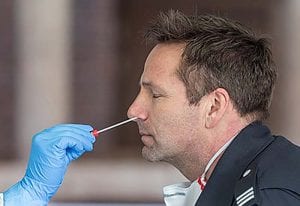Some PCR COVID test effectiveness is compromised.

New troubling reports are emerging about at least one of the most effective molecular COVID tests. These PCR tests are having problems with a variant of the deadly virus. The US Food and Drug Administration (FDA) listed the tests with potentially compromised accuracy.
Daily COVID cases continue to increase
Worldwide, daily new cases and deaths of COVID-19 continue to increase. New daily cases of COVID-19 increased in recent days to more than 780,000 cases. Deaths increased to almost 13,000 daily.
To understand this problem we need to understand some of the technical details of PCR testing and the COVID-19 virus.
READ ALSO:
With a COVID vaccine certificate, do you have freedom to vacation?
Will preflight virus testing ensure traveler safety? Or is it a hoax?
PCR COVID testing is the “gold standard,” but far from perfect.
PCR (Polymerase chain reaction) tests are molecular tests that look for traces of the COVID-19 virus’ genetic material in samples taken from the noses and throats of those being tested in order to determine if they are infected with COVID. The U.S. Centers for Disease Control and Prevention (CDC) considers PCR testing to be the “gold standard.” It’s the standard because it has the lowest rates of both false positives and false negatives.
COVID-19’s incubation period is two weeks, but those infected with COVID-19 typically become symptomatic about five days after they’re infected. Travelers who quarantine for two weeks without getting sick are safe to be with others. Travelers with false-negative COVID test results who don’t quarantine will often infect many others at their destination.
Timing is critical to COVID test effectiveness.
For all COVID-19 testing, including PCR, timing is a major factor influencing the tests’ false positive rate and therefore whether or not they can be reliably counted upon to produce dependable results indicating if a person is infected with COVID-19.
In the American College of Physicians Annals of Internal Medicine (AIM), a study of false-negative rates of PCR testing of COVID-19 (SARS-CoV-2), was published in August 2020. The purpose of the study was to “estimate the false-negative rate by day since infection.”
The study estimated that during the early days of infection, false-negative tests ranged from 67 to 100 percent. On the fifth day, when most people infected with COVID-19 first have symptoms, the false-negative rate is still 38 percent. So, the “gold standard” test will not detect those infected early.
In the first five days after infection PCR testing can’t accurately test travelers
So, we can conclude that during the course of the disease, in the first days following infection, even the best test for COVID-19, PCR, can’t accurately and reliably determine if a traveler is or is not infected. Due to the false-negative rate of PCR testing alone, I question a national strategy to prevent the spread of COVID-19 from travelers that’s solely based on a single test for the virus made within 72 hours of departure or upon arrival.
Now comes news from JAMA (The Journal of the American Medical Association) and the FDA that the SARS-CoV-2, B.1.1.7 variant of COVID-19 is causing problems for some of the PCR tests used to determine if people are infected with the virus.
The SARS-CoV-2, B.1.1.7 variant, also known as the U.K. variant was originally discovered in the United Kingdom last year. It’s rapidly heading toward being the dominant version of the virus in the world. Public health experts estimate that B.1.1.7 is 40 to 80 percent more transmissible and 35 percent more lethal than the original COVID-19 virus.
If PCR tests have difficulty determining if someone is infected with the U.K. variant of COVID, that would be serious no matter what, but it’s particularly serious due to its transmissible and lethal factors.
PCR testing of people infected with the U.K. variant may have more false negatives than usual.
According to a JAMA research letter by Kevin A. Brown, Ph.D., and others, PCR tests are unreliable. The mutation in the virus “can result in an undetectable S-gene target” for some testing methods. Tests of people infected with COVID variants may have increased false negatives.
The FDA has put PCR tests on a list for compromise by virus variants. These are made by Cepheid, Thermo Fisher, Applied DNA Sciences and Mesa Biotech. They’re among the most used PCR tests in the US. The tests look for multiple COVID targets within the virus’ RNA. These tests generally should be able to continue to detect one target. However, the FDA still put it on their compromised list.
A single PCR test taken close to departure or upon arrival of an international flight is not reliable. Tests can’t determine if a traveler COVID infection. Some PCR tests have problems testing a dominant COVID variant. That adds to the uncertainty of whether or not a traveler who tests negative is or is not infected. Nations need to reevaluate their dependence on testing travelers with a single PCR test to decide if they can be free to visit at their destination.
After many years working in corporate America as a chemical engineer, executive and eventually CFO of a multinational manufacturer, Ned founded a tech consulting company and later restarted NSL Photography, his photography business. Before entering the corporate world, Ned worked as a Public Health Engineer for the Philadelphia Department of Public Health. As a well known corporate, travel and wildlife photographer, Ned travels the world writing about travel and photography, as well as running photography workshops, seminars and photowalks. Visit Ned’s Photography Blog and Galleries.



